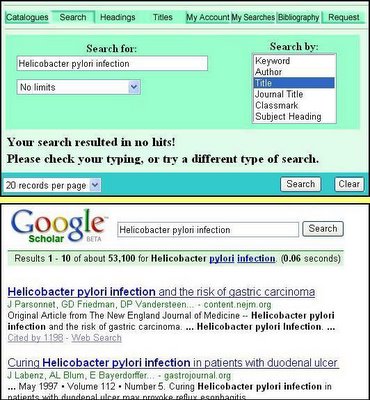I'm back and blogging live from ALA ! (Well,
I'm excited, even if you aren’t)
I attended the OCLC Symposium at ALA today (24 June 2006) with really interesting and invigorating presentations by futurists
Derek Woodgate, and
Wendy Schultz.
(I should at this point declare an interest, as I now work for
OCLC PICA.)
Woodgate talked about his very structured and business-like process for working on envisioning the future (it reminded me of my days at Accenture), but illustrated it with wild-side and leading-edge stuff from Nietzsche, DJ Spooky,
Stanza and all manner of other sources. He also mentioned an eBooks/Copyright
article in the New York Times by Kevin Kelly that I had just read on the flight over, and had found absolutely revelatory.
His multi-stage process, by the way, includes: framing, pulsing, mapping, scaping, tuning, and fabbing.
Schultz gave more attention to the idea of moving toward 'preferable' futures (rather than a passive prediction); her steps are: identify change, critique implications, imagine difference, envision preferences.
She gave what seemed to me to be a rather breathless account of how cool teenagers are these days and how chip-implanted we will all be in the future, but I think I was getting a bit 'futured-out' and cynical by that stage. (Although I liked her convergence of implanted mobile phones and telepathy.)
I found myself thinking (again) about how 'actually everything is the same, really'. If you take the long/historical view (which I am very unqualified to do) it seems to me that maybe key guides to predicting the future are enduring fundamentals evidenced in our past. Two controversial and ill-thought-out examples (as I write it is 1am in New Orleans and 7am in London): Hitler could have predicted his 'future' in Russia by consulting Napoleon, and we could make good predictions about Muslim fundamentalism by examining the Inquisition. We need to read more
Peter Jones.
Surprisingly, neither speaker mentioned the much-hyped
James Martin Institute for Science and Civilization being set up at Oxford University (although Schultz lives in Oxford and Woodgate is a Brit), although I don't really care, because the website of the JMIFSAC is all in
Flash, so they are obviously evil.
Here's my prediction (validated late tonight by an eminent but anonymous library technology futurologist outside a New Orleans bar):
Maybe libraries will not survive the next 100 years, but librarians will become of increasing importance in resolving, mediating and contextualising the information that is no longer in the library but all around us.



